Community Comes Together to Eradicate Suicide—and the Related Stigma
Print This Post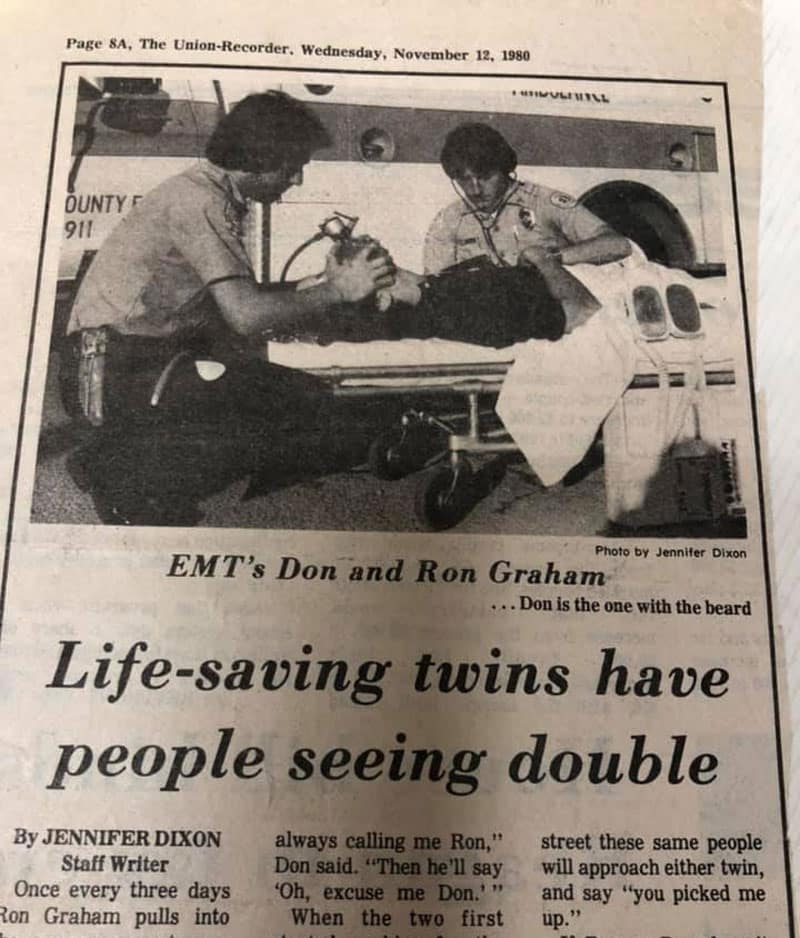
Twin brothers Don and Ron Graham were featured in the Nov. 12, 1980, edition of The Union-Recorder for saving lives in their community.
by Madeline Zupko
Putting an end to preventable deaths by suicide extends beyond Don Graham’s role as Jones County Fire Rescue chief and Emergency Management Agency (EMA) director. It’s a personal obligation.
“August 8, 2020, marked five years since I lost my identical twin brother to suicide,” said Graham. “Ron and I talked on the phone every day. We talked that morning for 41 minutes about the NHL, the Braves, and even what we were going to watch on TV that evening—nothing out of the ordinary. My brother and I both served as firefighters and paramedics for more than 35 years. A big part of me died that afternoon when I received the unbelievable news. It’s still unbelievable in my mind.”
Nearly 1,600 preventable deaths by suicide were reported in Georgia in 2018. That’s an average of four lives lost every day. Suicide—the second leading cause for children and adults ages 10 to 24—claimed more lives than homicides, car accidents, or fatal opioid overdoses. Research shows that many more individuals attempt suicide than die by suicide, and even more struggle with thoughts of taking their own lives. Survivors deeply impacted by their loss also require support.
When Jones County Family Connection and Augusta University established a Suicide Prevention Coalition, Graham was eager to get involved. “I was incredibly anxious and had a burning desire when I heard that there would be a team and training in my area that pertained to suicide,” he said.
Martha Tingen, professor of medicine and pediatrics at the Medical College of Georgia at Augusta University, first reached out to Joy Carr, coordinator of Jones County Family Connection, after the university received a grant from the Georgia Department of Behavioral Health and Developmental Disability (DBHDD), which works with government agencies, behavioral health organizations, community partners, nonprofits, educators, clinicians, and law enforcement to mitigate suicide attempts and deaths in our state.
Jones County was one of two counties in Region 2 of DBHDD’s six regions identified in the grant, called Choose Life, which focuses on suicide prevention, intervention, and postvention. Jones County has the highest suicide rate out of 33 counties in Region 2 and ranks 10th in the state for suicides. The county was ranked at a two for readiness at handling and preventing suicide in 2019.
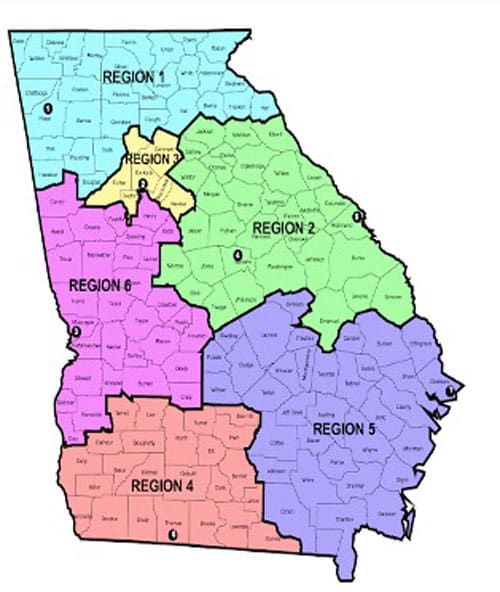
“That meant our community didn’t have the information to understand there was a problem,” said Carr. “We were starting at ground zero, but the community stepped up. Our county commissioners have supported our efforts, and several attended the class and participated in coalition meetings. They recognize that this is an issue for our community and something we want to correct. We’re spreading a message of hope.”
Sharing data with the Jones County Health Department helped expand an existing partnership and opened up another opportunity for collaboration. The same occurred with the high number of foster parents serving children at high risk within and outside Jones County who want to help.
Tingen served as committee lead on the DBHDD state task force that developed the Georgia Strategic Suicide Prevention Plan 2020 – 2025. “It was imperative we go where the need was the greatest and we were glad to do so,” she said.
The plan aims to increase suicide prevention awareness across the state, develop and implement best clinical and preventive practices, and share information about suicide and effective methods for prevention. Georgia was the first state in the nation to develop a prevention plan in 2001, when the governor and Georgia General Assembly appropriated funds to address suicide.
The DBHDD Office of Behavioral Health Prevention and Federal Grants (OBHPFG) uses the strategic prevention framework and a public health approach to implement evidence-based strategies within local communities with high suicide burden to achieve state-level positive outcomes.
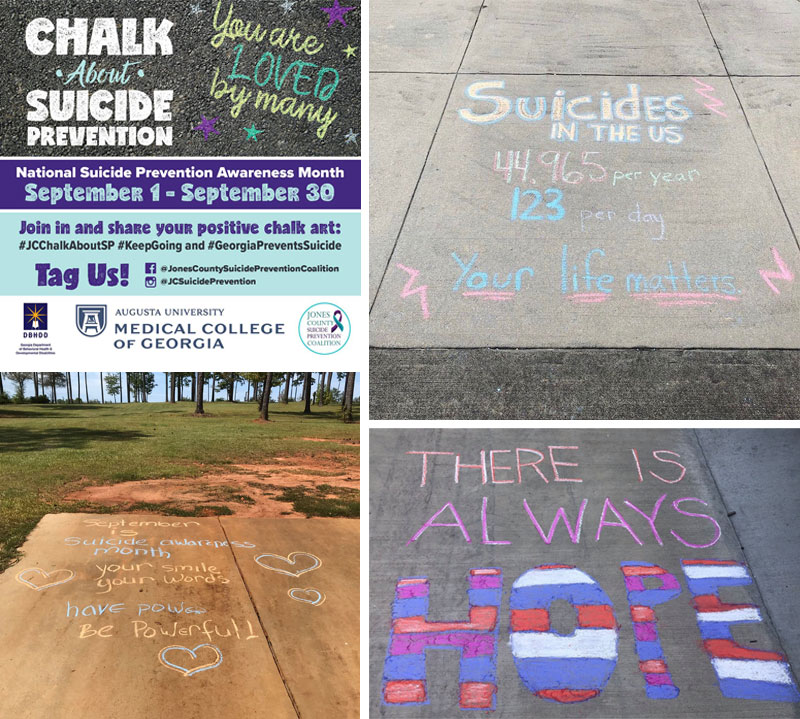
“Dr. Tingen understood the power of community collaboration and reached out to me for the support of Jones County Family Connection,” said Carr. “I was able to immediately pull in all the partners we needed. These strong existing relationships enabled Dr. Tingen and her team to come in and immediately start helping us address suicides.”
The Suicide Prevention Coalition, which aims to prevent suicide at its root by educating the community on the signs of suicidal thoughts, emerged through this partnership. Carr serves as a liaison between the community partners and Augusta University.
One of the coalition’s first initiatives was to get Question, Persuade, and Refer (QPR) training—how people should react to those around them who show signs of suicidal thinking and the steps to consummate the issue—out to the community.
“QPR is known as the CPR for suicide prevention,” said Carr. “It’s that rapid response, knowing what to ask, being able to identify body language that leads you to know someone is having suicidal thoughts.”
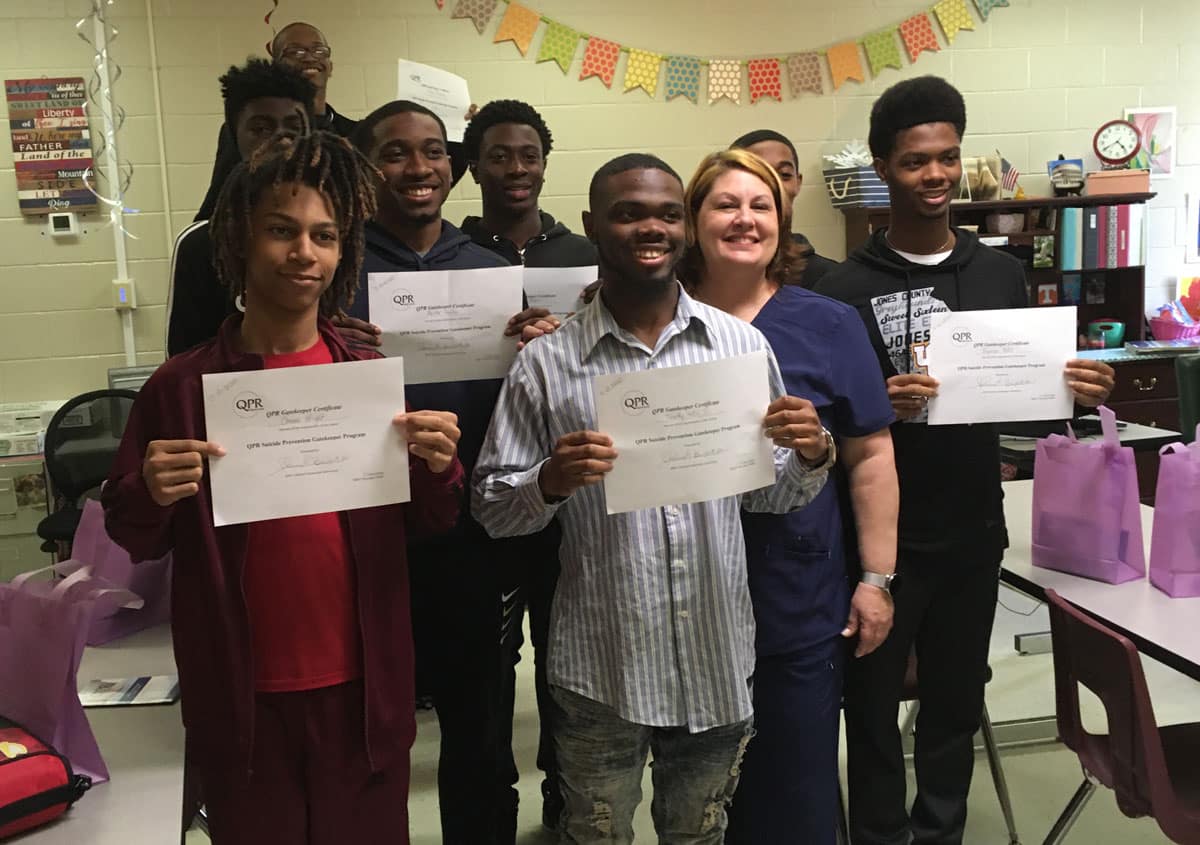
Manifest Your Destiny group with trainer Sherry Bryant, nurse manager of Jones County Health Department (second from left), became QPR Certified in March 2020 before the COVID-19 lockdown.
Beginning in Nov. 2019, the Coalition began offering two-hour QPR training and within the first five months 250 community members completed it. The coalition offered classes to help first responders identify patients and coworkers possibly suffering from suicidal thoughts, how to quickly intervene, and how to refer them to support.
“The pandemic presented challenges to the coalition, but with our ability to adapt, both Augusta University and Jones County Family Connection have found new forms of success,” said Carr.
The coalition reimagined QPR training in a virtual format and Jones County Family Connection, with help from volunteers and partners, sent out 46,000 mailers with contact information for the Georgia Crisis and Access Line (GCAL) and information about QPR training to all zip codes touching the county. The coalition also shared prevention information on the radio and digital billboards.
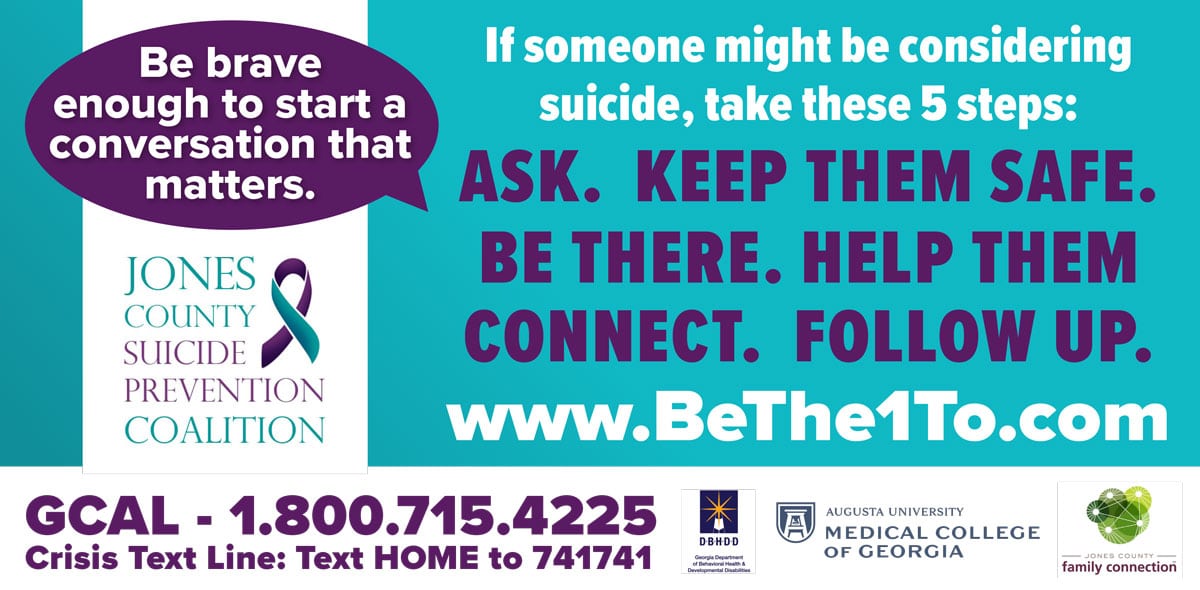
“COVID-19 has caused increased rates of suicides, opioid overdose deaths, and numerous mental and emotional health challenges, financial, economic, and basic needs of food—all significant stressors,” said Tingen. “We’re all created to be social beings and social isolation, virtual learning, everything alone is unhealthy for the body, mind, spirit, and soul. This coalition’s main purpose is to reach as many community members as possible to inform them and prevent suicide.”
There were zero suicides in Jones County from Sept. 2020 through Jan. 2021. “I attribute this largely to amazing work done by the people of Jones County, Joy Carr and the Coalition, and the creation of an environment and culture where people are reaching out for help when they need it,” said Tingen.
Carr credited the Collaborative structure. “The main point for all Georgians is, if you see an issue in your community, something your community is ready to address, your local Family Connection Collaborative has that foundational starting point already built into it,” she said.

Graham also is looking ahead to when the pandemic restrictions are lifted, because he intends to make QPR training mandatory to all first responders.
“Our personnel are exposed to troubled patients who are suicidal, and our coworkers are exposed to high-risk emergencies that may in turn put them at risk for suicide,” he said. “It’s not so much being an EMA director that inspired me to be a part of the coalition as much as it was being struck down by the suicide of someone I loved more than any one thing. My position provides me with more resources to be able to reach others who may be suffering from mixed emotions, teetering on the fence between suicide and life.”
For more information about the efforts of this coalition, you can visit the Jones County Suicide Prevention Coalition Facebook page or the DBHDD Suicide Prevention site.
Download the DBHDD Georgia Suicide Prevention Strategic Plan 2020 – 2025.
Learn more about QPR training.
If you or a loved one are experiencing suicidal thoughts, reach out to the Georgia Crisis and Access Line at 1-800-715-4225.
Contact:
Bill Valladares
GaFCP Communications Director
404-739-0043
william@gafcp.org
Follow us on Twitter: @gafcpnews
Connect with us on Facebook.
